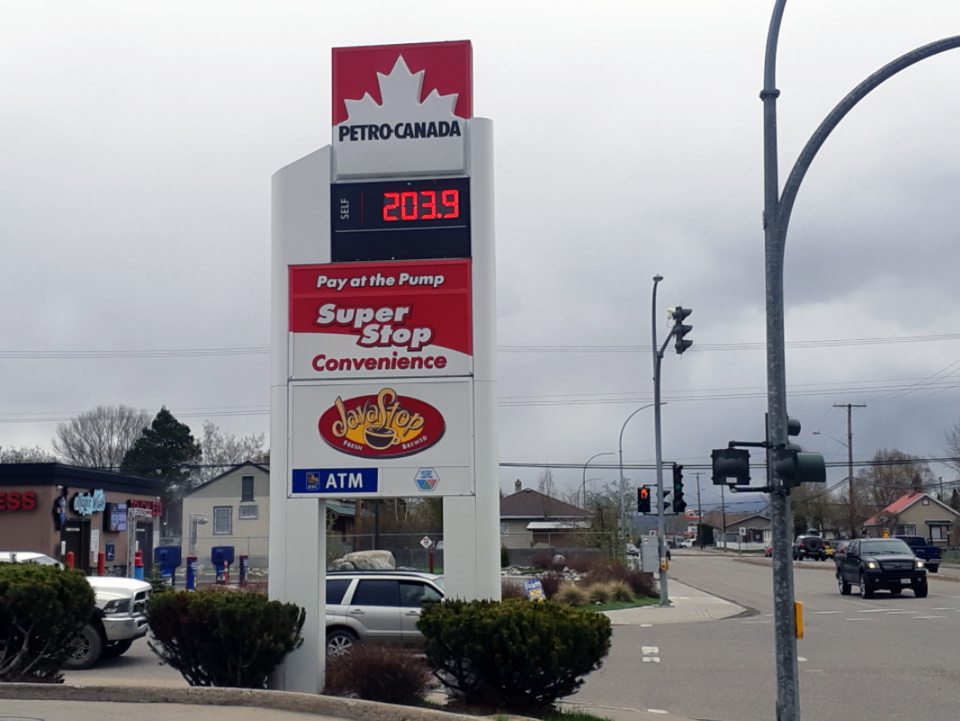Gasoline prices in Prince George reached a record high Monday with at least one filling station charging $2.03.9 per litre.
And it’s going to get worse before the prices start to drop.
With the Victoria Day long weekend coming up in less than two weeks, the price at the pumps in B.C. is expected to rise another five cents per litre, with demand increasing as people take to the roads to take advantage of the unofficial first long weekend of summer.
Gasoline prices today range from $2.03.9 at the Petro Canada at Fifth Avenue and Carney Street to $185.9 at Costco.
Patrick De Haan, head of petroleum analysis for GasBuddy, a Boston-based tech company that operates website and apps that provide real-time price monitoring of gas stations in the U.S., Canada and Australia, said oil companies will continue to take advantage of consumers as long as they can. Prices have surged since the start of the Russia’s war in Ukraine, which has put the squeeze on world petroleum supplies and that shows no signs of abating.
“Oil companies are price-takers and whatever the market decides what their prices are, high or low, they sell it at whatever the prevailing price is and we saw a primary example of that during COVID,” said De Haan.
“Oil companies would never have voluntarily sold below zero but we did see oil go negative and they were forced to sell at whatever the market price was then, as they’re selling today. The only difference is that market fundamentals that determine the price of oil have significantly changed.
“We continue to see as a result of the aggravation between Russia and Ukraine that supply continues to come off the global market through sanctions and inherently the oil that left in supply becomes that much more valuable. Demand has not gone down, in fact it has strengthened from recovery from the pandemic and we are simply at a point where oil supply is drastically reduced compared to demand and that is pushing prices up.”
De Haan says there’s no real advantage for British Columbian consumers being close to fuel supplies in Alberta and the northeastern region of the province because the oil companies will continue to sell at world market prices.
“If Canada was removed from the situation and could arbitrarily lower its price (of a barrel of oil) to $50 there would be no investment in oil and gas and the sector would eventually cease to exist because it’s not profitable,” said De Haan. “That’s why it’s so important that provinces like Alberta are subject to the global prevailing price and are not fenced off from the global market. Any countries that are fenced off from the global market or have price controls generally will start to see supply issues because oil companies will fail to produce because there’s less incentive.
“The high prices incentivize companies to raise production, which takes time. But everyone’s part of the global economy and you can’t reduce one oil producer from that. Everyone globally is paying the market price for oil, less the countries (like Venezuela) that subsidize and pay the difference.”
The provincial carbon tax increase which took effect April 1, raised the levy on total greenhouse gas emissions from $45 per tonne to $50 per tonne. That added 2.2 cents to the cost of a litre of gasoline and the province is now taking 9.6 cents per litre. The carbon tax adds 11.7 cents to the cost of diesel, which was selling for $2.11.8 per litre Monday morning at the Shell station at Fifth Avenue and Tabor Boulevard.
The price at the pump hit a record $2.23 over the weekend in Vancouver and were in the $2.09 range Monday in Victoria. B.C. gasoline prices are among the highest in Canada.
“A lot of that is B.C. is relatively isolated from the rest of Canada,” said De Haan. “There is some oil that flows in but B.C. also has a tremendous amount of taxation and that impacts prices as well.
“It certainly is beneficial to be closer to a refinery (there’s one in Prince George), but that can’t overpower that politicians have levied a terrific amount of carbon taxes and fuel taxes to the price motorists are paying at the pump.”
And he says there’s no relief in sight this summer.
“If demand doesn’t slow down, I think there a guarantee we’re not going to see an improvement in the supply side of the equation, especially with the EU considering further sanctions on Russia’s oil,” said De Haan.
“So if anything, prices will continue to go up is demand continues to grow. My guess is that the high prices will cause some Canadians to stay closer to home and that will eventually reduce prices, not to the point where we’ll want to pay them, but there may be enough demand (decrease) from the high price that may prevent prices from escalating further down the road.
“Much of the imbalance and reason for high prices is likely to persist for some time and that is the Russian war in Ukraine is not likely to change anytime soon.”



